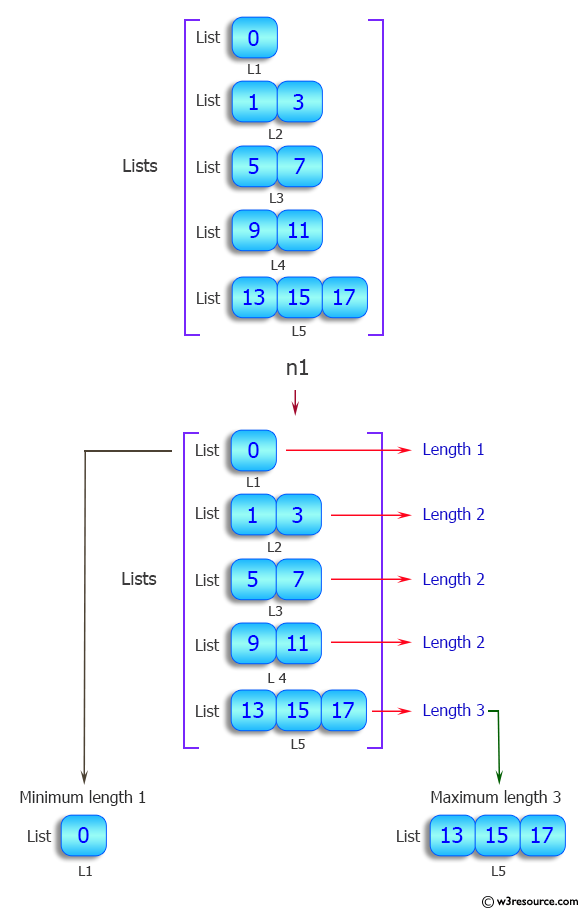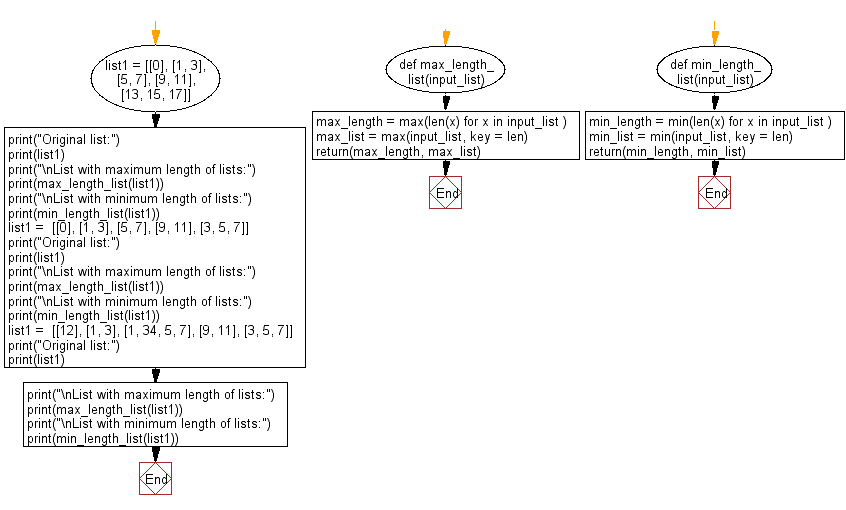Python: Find the list with maximum and minimum length
Find List with Max and Min Lengths
Write a Python program to find a list with maximum and minimum lengths.
Visual Presentation:

Sample Solution:
Python Code:
# Define a function 'max_length_list' that finds the maximum length and the list with the maximum length in 'input_list'
def max_length_list(input_list):
# Find the maximum length of lists in 'input_list'
max_length = max(len(x) for x in input_list)
# Find the list with the maximum length in 'input_list'
max_list = max(input_list, key=len)
return (max_length, max_list)
# Define a function 'min_length_list' that finds the minimum length and the list with the minimum length in 'input_list'
def min_length_list(input_list):
# Find the minimum length of lists in 'input_list'
min_length = min(len(x) for x in input_list)
# Find the list with the minimum length in 'input_list'
min_list = min(input_list, key=len)
return (min_length, min_list)
# Create a list 'list1' containing sublists of varying lengths
list1 = [[0], [1, 3], [5, 7], [9, 11], [13, 15, 17]]
# Print a message indicating the original list
print("Original list:")
# Print the contents of 'list1'
print(list1)
# Print a message indicating the list with the maximum length of sublists
print("\nList with maximum length of lists:")
# Call the 'max_length_list' function with 'list1' and print the result
print(max_length_list(list1))
# Print a message indicating the list with the minimum length of sublists
print("\nList with minimum length of lists:")
# Call the 'min_length_list' function with 'list1' and print the result
print(min_length_list(list1))
# Create a different list 'list1' containing sublists of varying lengths
list1 = [[0], [1, 3], [5, 7], [9, 11], [3, 5, 7]]
# Print a message indicating the original list
print("Original list:")
# Print the contents of the new 'list1'
print(list1)
# Print a message indicating the list with the maximum length of sublists
print("\nList with maximum length of lists:")
# Call the 'max_length_list' function with the new 'list1' and print the result
print(max_length_list(list1))
# Print a message indicating the list with the minimum length of sublists
print("\nList with minimum length of lists:")
# Call the 'min_length_list' function with the new 'list1' and print the result
print(min_length_list(list1))
# Create another list 'list1' containing sublists of varying lengths
list1 = [[12], [1, 3], [1, 34, 5, 7], [9, 11], [3, 5, 7]]
# Print a message indicating the original list
print("Original list:")
# Print the contents of the new 'list1'
print(list1)
# Print a message indicating the list with the maximum length of sublists
print("\nList with maximum length of lists:")
# Call the 'max_length_list' function with the new 'list1' and print the result
print(max_length_list(list1))
# Print a message indicating the list with the minimum length of sublists
print("\nList with minimum length of lists:")
# Call the 'min_length_list' function with the new 'list1' and print the result
print(min_length_list(list1))
Sample Output:
Original list: [[0], [1, 3], [5, 7], [9, 11], [13, 15, 17]] List with maximum length of lists: (3, [13, 15, 17]) List with minimum length of lists: (1, [0]) Original list: [[0], [1, 3], [5, 7], [9, 11], [3, 5, 7]] List with maximum length of lists: (3, [3, 5, 7]) List with minimum length of lists: (1, [0]) Original list: [[12], [1, 3], [1, 34, 5, 7], [9, 11], [3, 5, 7]] List with maximum length of lists: (4, [1, 34, 5, 7]) List with minimum length of lists: (1, [12])
Flowchart:

For more Practice: Solve these Related Problems:
- Write a Python program to find the longest sublist within a list of lists.
- Write a Python program to find the shortest sublist within a list of lists.
- Write a Python program to sort a list of lists by length.
- Write a Python program to filter out lists shorter than a given length.
Go to:
Previous: Write a Python program to count number of lists in a given list of lists.
Next: Write a Python program to check if a nested list is a subset of another nested list.
Python Code Editor:
What is the difficulty level of this exercise?
Test your Programming skills with w3resource's quiz.
